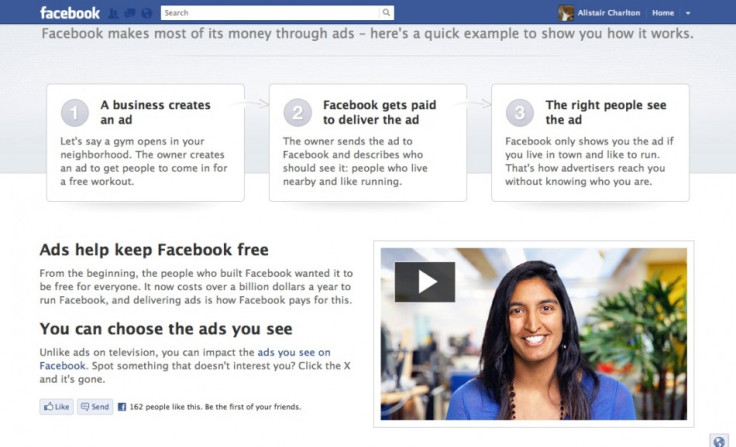We Do Not Sell Your Information: Facebook Explains Advertising

Facebook has released a video and guide to help explain how the social network makes money from advertising, and confirms that the site does not sell users' information.
At the top of users' news feed there is a temporary notice asking "Ever wonder how Facebook makes money?" and a link to the new information page.
"Ads help keep Facebook free", the page says. "From the beginning, the people who built Facebook wanted it to be free for everyone. It now costs over a billion dollars a year to run facebook, and delivering ads is how Facebook pays for this."
A popular myth is that Facebook sells users' information to companies in return for advertising. This is not the case and the 800-million-user network confirms this.
"Facebook does not sell your personal information. Instead, Facebook makes its money from showing you ads. Selling your information would actually be bad for Facebook. Here's why: Facebook was created to help you share and connect with the people in your life.
"If you don't feel like you're in control of who sees what you share, you probably won't use Facebook as much, and you'll share less with your friends. Not only is that bad for Facebook, it's also bad for you. That's why only the people you choose to share with see your stuff."
On Wednesday, Facebook announced Sponsored Stories, which will feature users' display pictures and names in adverts for products and businesses that they have interacted with.
The website explains: "Posts or activity that include your profile photo or name - like a story about you liking Starbucks - may be paired with an ad or highlighted in a sponsored story. Your name and photo will only appear to people you shared the original story with."
The video goes on to explain how a business creates an advert and targets only the users that it wants to sell to. So if a company wants to sell wedding venues in Hampshire, it could send an advert to the Facebook pages of users who are engaged and live in that county.
© Copyright IBTimes 2025. All rights reserved.






















